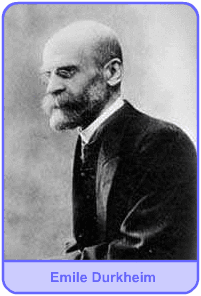Most theory is nothing more than a hypothesis that seems to be confirmed by observation. That is a hunch that seems 'true'. Theory is thus an organizing principal, a particular viewpoint from which we view the world and interpret what we see.
大多数理论不过是一种似乎被观察证实的假设。这就是一种似乎 "真实 "的预感。因此,理论是一种组织原则,是我们看待世界和解释我们所看到的东西的一种特殊观点。
What you will find with theory in sociology is that competing theories often agree about what can be observed but disagree about what these observations mean. Thus where theory leads you depends on how you interpret the situation or behaviour from which you start.
在社会学中你会发现,相互竞争的理论往往同意可以观察到的东西,但对这些观察结果的含义却有不同意见。因此,理论如何引导你,取决于你如何解释你所处的情况或行为。
Example 例子:
Both Marxism and Functionalism agree that schooling socialises students into the prevailing norms and values of a society. But, whether this is a 'good' thing or not depends on whether it is believed that the present state of a society (the status quo) is worth preserving or in need of change. You need to try and distinguish between statements of fact and statements of value.
马克思主义和功能主义都认为,学校教育使学生融入社会的主流规范和价值观。但是,这是否是一件 "好事",取决于人们是否认为一个社会的现状(现状)值得保留或需要改变。你需要尝试区分事实的陈述和价值的陈述。

In sociology there are two main structural approaches 在社会学中,有两种主要的结构方法:
- Consensus theory 共识理论
- Conflict theory 冲突理论
These are the theories that attempt to relate educational systems to societal outcomes.
这些是试图将教育系统与社会结果联系起来的理论。
Note: These theories look at schooling from the 'outside'.
注:这些理论从 "外部 "看学校教育

Functionalism investigates institutions to consider the functions they perform in society. The functionalist premise is that if an institution exists, then there must be some reason for its existence. As regards education, functionalists assume that educational institutions serve some societal need. Educational institutions are examined for the positive contribution they make towards maintaining society.
功能主义对机构进行调查,考虑它们在社会中发挥的功能。功能主义的前提是,如果一个机构存在,那么它的存在就一定有某种原因。就教育而言,功能论者认为教育机构是为某种社会需求服务的。对教育机构的审查是为了了解它们对维护社会所做的积极贡献。
Education is seen as vital as regards socialization. All societies have to have ways of socialising new members, and some societies need specialist institutions for differentiating between people and allocating them to specific levels of economic activity within their society - such is the case with industrial societies.
在社会化方面,教育被认为是至关重要的。所有的社会都必须有使新成员社会化的方法,一些社会需要专门机构来区分人们,并将他们分配到社会中特定的经济活动水平--工业社会就是如此。
So here are two central functions performed by educational institutions 因此,这里有教育机构履行的两个核心职能:
- General socialisation of the whole population into the dominant culture, values and beliefs of a society. 使全体人民普遍融入社会的主流文化、价值观和信仰。
- Selecting people for different types and levels of education. 为不同类型和水平的教育选拔人才。
These two basic intentions are suggested by Parsons. He argues that education has the two central functions outlined above. In brief, education meets the needs of the system by 这两个基本意图是由帕森斯提出的。他认为,教育具有上述两个核心功能。简而言之,教育通过以下方式满足系统的需要:
- Making sure that all children have a basic commitment to their society's values and beliefs. 确保所有儿童对其社会的价值观和信仰有基本的承诺。
- Preparing individuals for their specific location within the social hierarchy. 为个人在社会等级制度中的具体位置做准备。
Note: Point 1 is essentially what Marxists regard as the 'hidden curriculum'.
注:第1点基本上是马克思主义者所认为的 "隐藏课程"。
These two functions achieve different but overlapping goals. Transmitting norms and values promotes social solidarity. Differentiation matches skills to societal needs and supports society's economic needs.
这两种功能实现了不同但重叠的目标。传递规范和价值,促进社会团结。差异化使技能符合社会需求,支持社会的经济需求。

The idea of differentiation derives from Durkheim. He argued that as societies develop and become more complex they need to enhance the division of labour and provide specialist agencies for executing this function. Education takes over the role previously filled by the family, work and any other social location that presented a learning environment.
分化的概念来自于杜克海姆。他认为,随着社会的发展和变得更加复杂,他们需要加强劳动分工,并为执行这一功能提供专门机构。教育取代了以前由家庭、工作和任何其他提供学习环境的社会场所所扮演的角色。
At the level of individuals, industrial societies require specialists and education is seen as providing the appropriate educational output. More generally, Durkheim explains this change in the nature of relationships between individuals in a society as the change from solidaristic to organic forms of social solidarity (cohesion).
在个人层面上,工业社会需要专家,而教育则被视为提供适当的教育产出。更广泛地说,杜克海姆将社会中个人之间关系性质的这种变化解释为社会团结(凝聚力)从团结主义到有机形式的变化。
The existence of a connection between personal abilities and industrial needs is assumed by the tendency towards meritocracy. That is, people come to fill particular positions on the basis of achievement, rather than their ascribed characteristics.
个人能力和产业需求之间存在的联系是由任人唯贤的趋势所决定的。也就是说,人们在成就的基础上,而不是在他们被赋予的特征的基础上,来填补特定的职位。
Note: The principal functionalist support for the existence and need for meritocracy is Davis and Moore, 'Some Principles of Stratification'.
注:功能主义对任人唯贤的存在和需要的主要支持是戴维斯和摩尔的《分层的一些原则》。
However, although it is true that achievement is more important in societies such as ours, social class, gender and ethnicity remain as important 'indirect determinants' in the sense that the quality of a person's educational attainment can be related to these ascribed characteristics.
然而,尽管在我们这样的社会中,成就确实更加重要,但社会阶层、性别和种族仍然是重要的 "间接决定因素",因为一个人的教育成就的质量可能与这些被赋予的特征有关。

The concept of meritocracy tends to lead functionalists into the area of genetics rather than culture. It is argued that some people are quite simply 'brighter' than others, and the education system picks these people out and gives them a higher level of education. Schools are seen as neutral and impartial screening devices.
择优录取的概念往往会把功能主义者引向遗传学而不是文化领域。有人认为,有些人比其他人更 "聪明",而教育系统会把这些人挑出来,给他们更高层次的教育。学校被看作是中立和公正的筛选装置。
Note: These ideas are still popular and increasingly powerful.
注:这些想法仍然很流行,而且越来越强大。
Clearly, it would be nonsense to deny that schools do differentiate and allocate, but to subscribe to the functionalist position requires more than this. Functionalists argue that this function is a good and necessary thing.
显然,否认学校确实在进行区分和分配是无稽之谈,但要认同功能主义的立场,需要的不仅仅是这些。功能论者认为,这种功能是一种好的和必要的东西。
The functionalist account is an idealised one, based on the illusion that educational attainment is based on merit. The account does not 'cash out' in terms of observable outcomes. To believe that schooling develops talents for the benefit of society we would need to show; first, that educational achievement results from ability and, second, that such abilities are taken up by the occupation system in a free market. They cannot, it is an observable fact that educational achievement is systematically related to social factors and that educational success is not clearly related to occupational attainment.
功能主义的说法是一种理想化的说法,基于教育成就是基于成绩的幻想。这种说法并没有从可观察到的结果方面进行 "兑现"。要相信学校教育是为了社会的利益而培养人才,我们需要证明:第一,教育成就是能力的结果,第二,这种能力在自由市场上被职业系统所接受。他们不能,这是一个可以观察到的事实,即教育成就与社会因素有系统的联系,教育成功与职业成就没有明显的联系。
Functionalism - Good points 功能主义--好的观点
- Structural perspective enables analysis to move beyond the level of the classroom or individual school. 结构性观点使分析超越了教室或个别学校的层面。
- Links schools to systemic needs of the wider society. 将学校与更广泛的社会的系统性需求联系起来。
- Identifies schools as transmitters of knowledge, norms and values and as a selecting mechanism. 认定学校是知识、规范和价值观的传播者,是一种选择机制。
Functionalism - Criticisms 功能主义--批评意见
- Overstates the extent to which education serves the 'common good'. Underestimates interests of dominant groups. 高估了教育为 "共同利益 "服务的程度。低估了主导群体的利益。
- School is a 'black box'. Does not investigate the 'meaning' of education for its participants. 学校是一个 "黑盒子"。没有研究教育对其参与者的 "意义"。
- Too much emphasis on power of school to shape attitudes. People seen as 'cultural dopes'. 过分强调学校塑造态度的力量。人们被视为 "文化白痴"。
For Marxists, education is apart of the superstructure of society. This superstructure is regarded as being ultimately subordinate to the base - the economic organization of society. The economic arrangements of a society structure the holding of wealth and capital and create social classes.
对马克思主义者来说,教育是社会上层建筑的一部分。这个上层建筑被认为是最终从属于社会的经济组织这一基础的。一个社会的经济安排构造了财富和资本的持有,并创造了社会阶层。

Marxists agree with functionalists that education contributes to the working of industrial society, and economic organisation. But, since Marxists disapprove of the organisation of society on capitalist lines, it follows that they disapprove of education in its present form.
马克思主义者同意功能主义者的观点,即教育有助于工业社会的运作和经济组织。但是,由于马克思主义者不赞成按照资本主义路线组织社会,因此他们也不赞成目前形式的教育。
Louis Althusser argued that economic relations structure education so as to reproduce these same economic relations. Education is part of the system of the reproduction of labour power. Schooling, argued Althusser, is an 'ideological state apparatus'. Schools work to ensure that those who are to do the work will do so co-operatively, out of a belief that the situation is just and reasonable.
路易斯-阿尔都塞认为,经济关系构建了教育,以便复制这些相同的经济关系。教育是劳动能力再生产体系的一部分。阿尔都塞认为,学校教育是一种 "意识形态的国家机器"。学校的工作是为了确保那些要做工作的人能够合作地去做,因为他们相信这种情况是公正和合理的。
From this point of view, the failure of so many pupils in schools is not a failing of the system (as for liberals) but actually what the schooling system is designed to do. So working class children who opt out, or fail, or find schools alien, are indications that schooling is working successfully. This reverses functionalism. Education is not designed to develop human potential, but to limit it.
从这个角度来看,这么多学生在学校的失败并不是制度的失败(对自由主义者来说),实际上是学校教育制度的设计。因此,工人阶级的孩子选择退出,或失败,或发现学校是陌生的,这表明学校教育正在成功地运作。这就颠覆了功能主义。教育的目的不是为了发展人类的潜力,而是为了限制它。
Such an approach is clearly capable of fitting the evidence on patterns of achievement. It can also help to uncover working class attitudes to education as being realistic rather than bloody-minded. However, is the account overly simplified? Are the working class willing fodder for the capitalists?
这种方法显然能够适应关于成就模式的证据。它也有助于揭示工人阶级对教育的态度是现实的而不是血腥的。然而,这种说法是否过于简化?工人阶级是否愿意成为资本家的炮灰?
Incidentally, critics have argued that the performance of the educational system in differentiating and hierarchically structuring students is not limited to capitalist economies. Karabel and Halsey point out that the actual performance of the educational system is remarkably similar in socialist countries.
顺便说一句,批评者认为,教育系统在区分和构建学生层次方面的表现并不限于资本主义经济。卡拉贝尔和哈尔西指出,在社会主义国家,教育系统的实际表现是非常相似的。
Marxism - Good points 马克思主义--好的观点
- Unveils the interests of the dominant and powerful groups in shaping schooling. 揭示了主导和强大群体在塑造学校教育方面的利益。
- Reveals the undeclared agenda of schooling. But, so do functionalists. 揭示了学校教育的未公开的议程。但是,功能主义者也是如此。
- Documents resistance by students to negative labelling. 记录了学生对负面标签的抵抗。
Marxism - Criticism 马克思主义--批评
- People treated as 'cultural dopes'. 人们被当作 "文化白痴"。
- Tends towards conspiracy theory 倾向于阴谋论
- Very value laden (capitalism - no advantages?). 价值非常高(资本主义--没有好处?)





